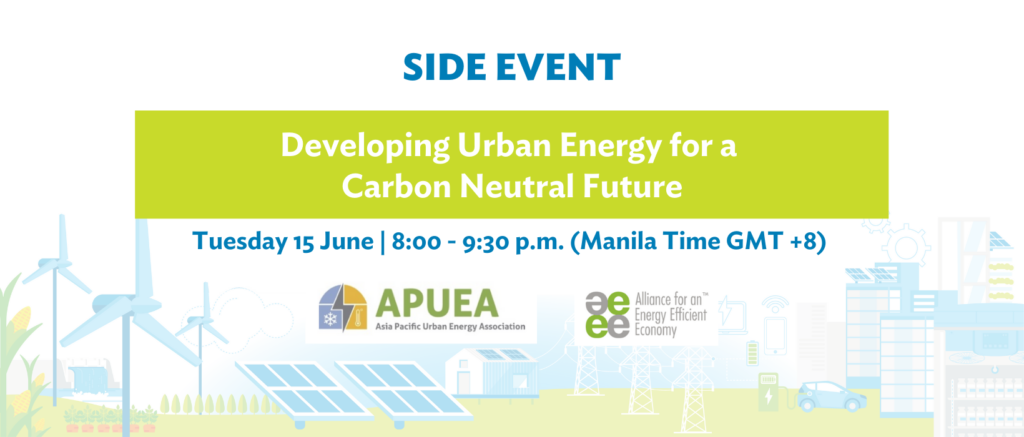Background
The importance of cities in the energy transition cannot be underestimated as they account for more than 70% of global CO2 emissions. At the same time, the urbanisation trend is continuing, and in 2030, it is projected that there will be 43 Mega Cities (cities with a population of 10 million or more) globally, and 35 will be in the Asia Pacific region. It is clear cities in the Asia Pacific region play a vital role in the transition towards a low carbon society, and efforts have to be made to introduce efficient, sustainable, and integrated energy systems and solutions.
2021 is the year of COP26 and the year when the world will begin to recover from the COVID19 pandemic. It is interesting that although countries have taken strong measures to reduce the spread of the coronavirus, GHG emissions have only dropped around 7% in 2020 compared to 2019. This highlights the enormous effort the world is facing to achieve the goal of the Paris Agreement of limiting global warming to 1,5 degrees Celsius compared to pre-industrial levels by reaching peak emissions as soon as possible and becoming climate neutral by 2050.
Building on the ACEF 2021 theme, “Accelerating the Low Carbon Transition in the Asia and the Pacific”, this session aims to explore and discuss challenges and opportunities that cities in the Asia Pacific are facing to develop sustainable and carbon-neutral urban energy systems and how it is possible to accelerate the transition to a low carbon society post COVID19.
Objectives
- Provide insights in the challenges which cities are facing in the energy transition.
- Share perspectives on Sustainable Urban Energy developments in cities.
- Discuss opportunities and challenges to accelerate the low carbon transition post COVID19.
- Disseminate regional experiences and international best practices.
- Bridge public and private stakeholders, stimulating partnership, and project developments.
Agenda
| Time (Manila) | Activities |
|---|---|
| 08:00-08:05 p.m. |
Opening Remarks and Session Introduction Peter Lundberg, Asia Pacific Urban Energy Association (APUEA) |
| 08:05-08:15 p.m. |
Urban Energy for a Carbon Neutral Future Mikael Jakobsson, Executive Director, Asia Pacific Urban Energy Association (APUEA) |
| 08:15-08:25 p.m. |
Developing Sustainable and Efficient Cooling Solutions for Cities in India Markus Wypior, German Corporation for International Cooperation GmbH (GIZ) |
| 08:25-08:35 p.m. |
Supporting India’s Energy Transition to Meet National (NDC) and International Sustainability Goals (SDG) via Sustainable Cooling in Built Environment & Cold Chain Tarun Garg, Programme Lead – Buildings and Communities, Alliance for an Energy Efficient Economy (AEEE) |
| 08:35-09:15 p.m. |
Panel: Accelerating the Low-carbon Transition in APAC Post COVID19 Moderator: Mikael Jakobsson, APUEA
|
| 09:00-09:25 p.m. | Q&A |
| 09:25-09:30 p.m. | Closing Remarks |
About Organizers
Asia Pacific Urban Energy Association (APUEA)
The Asia Pacific Urban Energy Association (APUEA) actively promotes the development of sustainable urban energy systems in the Asia Pacific region. Through the secretariat located in Bangkok, the association convenes cross-sectoral stakeholders, shares global and regional experiences and best practices, and promotes market development for sustainable urban energy systems. The APUEA platform serves as a bridge between the Association’s members and governments/international agencies in the Asia Pacific region, helping cities to accelerate the development of sustainable urban energy systems. APUEA is an initiative of the International Institute for Energy Conservation (IIEC), with support from an advisory board comprising representatives from United Nations Environment (UN Environment).
Alliance for an Energy Efficient Economy (AEEE)
Alliance for an Energy Efficient Economy (AEEE), is one of the leading organizations in India that works on creating awareness about energy efficiency as a resource. It is a policy advocacy and energy efficiency market enabler with a not-for-profit motive. We advocate for data-driven and evidence-based energy efficiency policies and research. We foster a culture of energy efficiency in India, working with industry, government and civil society organizations. AEEE advocates for Thermal Comfort for All, and a Lean-Mean-Green philosophy to design and construct net-zero energy-water-waste built environments, Sustainable Transportation and robust Energy Data Framework for better policy-making and implementation, to build a culture of energy efficiency in India. We are committed to achieve India’s energy transition for a climate-resilient and energy secure future and meet India’s commitments to the 2030 nationally determined goals (NDC) and UN sustainable development goals (SDG).
Point of Contact
Peter Lundberg, APUEA
Email: plundberg@apuea.org


You must be logged in to post a comment.